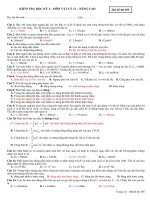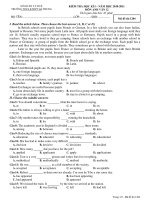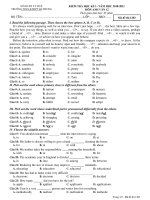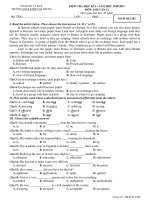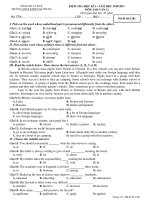KIỂM TRA HỌC KÌ I – NĂM HỌC 2010-2011 MÔN ANH VĂN 12 - Mã đề thi 1201 potx
Bạn đang xem bản rút gọn của tài liệu. Xem và tải ngay bản đầy đủ của tài liệu tại đây (133.47 KB, 2 trang )
Trang 1/2 - Mã đề thi 1201
SỞ GD-ĐT T.T.HUẾ
TRƯỜNG THCS &THPT HÀ TRUNG
KIỂM TRA HỌC KÌ I – NĂM HỌC 2010-2011
MÔN ANH VĂN 12
Thời gian làm bài: 45 phút.
HỌ TÊN: LỚP: SBD:
Mă đề thi 1201
I. Pick out the word whose underlined part is pronounced differently from the others.
Câu 1: A. handled B. installed C. confided D. confirmed
Câu 2: A. creates B. achieves C. struggles D. precedes
Câu 3: A. chicken B. child C. chemist D. church
Câu 4: A. reason B. seat C. heavy D. neat
II. Pick out the word whose primary stress is different from the others .
Câu 5: A. tuition B. counterpart C. ancestor D. nursery
Câu 6: A. decisive B. rewarding C. fantastic D. tertiary
Câu 7: A. retail B. attempt C. keenness D. entry
Câu 8: A. record B. fulfill C. adopt D. carry
III. Read the article below. Then choose the best answer (A, B, C or D).
In British schools most pupils learn French or German. In a few schools you can also learn Italian,
Spanish or Russian. Not many pupils learn Latin now. All pupils must study one foreign language until they
are 16. Schools usually organize school trips to France or Germany. Pupils travel in a group with their
teachers. They stay in a hotel or they go camping. Some schools have an exchange with another school in
France or Germany. A group of pupils from the British school go to the exchange town. Each pupil has a
partner and they stay with their partner’s family. They sometimes go to school with their partner.
Later in the year the pupils from France or Germany come to Britain and stay with their British
partners. Exchanges are very useful, because you can learn about daily life in another country.
Câu 9: In Britain, nowadays, not many pupils learn
A. Latin. B. French and German
C. Russian. D. Italian and Spanish.
Câu 10: Until British pupils are 16, they must study
A. one foreign language. B. a lot of foreign languages
C. two foreign languages. D. their own language.
Câu 11: In an exchange scheme, each pupil has a
A. partner. B. school. C. family’s partner. D. teacher.
Câu 12: Exchanges are useful because pupils
A. go to an exchange town. B. learn about daily life in another country.
C. stay in a hotel or go camping. D. travel in a group with their teachers.
IV. Choose the suitable answers.
Câu 13: You should concentrate what the interviewer is saying.
A. at B. in C. on D. to
Câu 14: His father is always willing to give a hand cleaning the house.
A. with B. for C. about D. in
Câu 15: My mother takes the responsibility running the household.
A. in B. for C. with D. by
Câu 16: The academic year in England is divided three terms.
A. in B. between C. among D. into
Câu 17: Reducing the size of classes may improve standards.
A. educated B. educating C. education D. educational
Câu 18: She has had to make some very difficult .
A. decided B. decisive C. decision D. decisions
Câu 19: How many did you have for the job?
A. applicants B. applications C. apply D. applied
Trang 2/2 - Mã đề thi 1201
Câu 20: Tom is a very person and writes lists for everything.
A. method B. methodic C. methodical D. methodically
Câu 21: He was as a full member of the society.
A. accepting B. accepted C. acceptable D. acceptance
Câu 22: Robert in three movies already. I’m sure he’ll be a star some day.
A. appeared B. has appeared
C. had appeared D. has been appearing
Câu 23: We missed the train. It by the time we arrived at the station.
A. left B. was leaving C. had left D. have left
Câu 24: By this time next year we the course.
A. will finish B. have finished
C. will have finished D. will have been finishing
Câu 25: If energy unlimited, many things in the world would be different.
A. would be B. will be C. were D. is
Câu 26: We are made all the cleaning in the house.
A. doing B. done C. to do D. do
Câu 27: . “ I’m sorry I have to leave so early,” he said.
A. He apologised for having to leave so early.
B. He apologised to have to leave so early.
C. He apologised that he has to leave so early.
D. He apologised to have left so early.
Câu 28: John said, “ You’d better not lend them any money, Daisy.”
A. John said Daisy not to lend them any money.
B. John said to Daisy not lend them any money.
C. John advised Daisy shoud not lend them any money.
D. John advised Daisy not to lend them any money.
IV. Read the following passage. Then choose the best option (A, B, C or D).
It’s always worth preparing well for an interview. Don’t just hope …<1>… the best. Here are a few tips.
Practise how you say things, as well as what you …<2>… to say. If you don’t own a video camera, perhaps
a friend of …<3>… does. Borrow it and make a video tape of yourself. Find …<4>… to watch it with you
and give you a …<5>… of advice on how you appear and behave.
Before the interview, plan what to wear. Find out how the company expects its …<6>… to dress. At the
interview, believe in yourself and be honest, open and friendly. …<7>…attention and keep your answers to
the point. The interviewer doesn’t want to waste time and …<8>… do you.
Câu 29: A. against B. for C. to D. at
Câu 30: A. intend B. consider C. imagine D. think
Câu 31: A. his B. yours C. mine D. ours
Câu 32: A. anybody B. nobody C. everybody D. somebody
Câu 33: A. number B. slice C. plenty D. bit
Câu 34: A. colleagues B. employees C. customers D. employers
Câu 35: A. Attract B. Give C. Turn D. Pay
Câu 36: A. so B. either C. neither D. or
V. Error Identificatior.
Câu 37: Ken does (A)lots of mistakes (B), but he never seems (C)to learn from (D) them.
Câu 38: People had much to learn (A) before (B) they (C) became civilization (D)
Câu 39: My son keeps (A) asking (B) me to have (C) his car fix (D) before he goes to Canada.
Câu 40: The football match (A) was televised (B) lively (C) from the National (D) Stadium.


